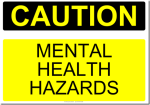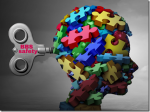The foundation of zero is intolerance. Zero is absolute and dominates the safety industry. It is the most mentioned language in the upcoming Zero Congress to be held in November in Sydney. Indeed, it is described by the Congress as the ‘common denominator’ of safety … [Read more...] about Why Zero Vision Can Never Tackle Mental Health
Search Results for: Mental health
Effective Strategies in Mental Health at Work
The strategy of triumphalism or learning from the suffering of others doesn’t work in helping people with mental health issues. Yet, this populist strategy is what Safety does most often (https://safetyrisk.net/playing-with-mental-health-in-safety-is-dangerous/). Yes, let’s parade out someone who … [Read more...] about Effective Strategies in Mental Health at Work
Playing With Mental Health in Safety is Dangerous
In the long tradition of valuing incompetence in Safety, we have this kind of stuff (Macmahon names "The Hulk" as mental health ambassador) () parading about as if it is of some value. I know let’s study culture and ask a chemical engineer!!! Of course, incompetence on culture (what we do … [Read more...] about Playing With Mental Health in Safety is Dangerous
No Help for Mental Health in Zero
No Help for Mental Health in Zero I came into work in the safety industry after many years in various professions including Community Services, not-for-profit services, Social Work, Education, Youth Services, Youth Detention, Pastoral Counselling, EAP and Corrections. In all of these professional … [Read more...] about No Help for Mental Health in Zero
How Not to View Mental Health and Safety
How Not to View Mental Health and Safety The latest animated promo from Worksafe Victoria is yet another classic fail when it comes to understanding and tackling mental health. Why is it that Safety continues to go to dumb animations and semiotics that convey the opposite message for what is … [Read more...] about How Not to View Mental Health and Safety
Mental Health, Risk and Safety – Part 2
Mental Health, Risk and Safety - Part 2 Part 2 of one of the most popular articles we have ever published, by Dr Rob Long from Human Dymensions. and author of the book “Real Risk” In the previous blog (Mental Health, Risk and Safety Part 1) I discussed the invisibility of mental health in risk … [Read more...] about Mental Health, Risk and Safety – Part 2
The Language of ‘Hazards’ and Psychosocial, Mental Health
Safety is the industry of ‘hazards’ and ‘controls’. This is the most popular and frequently used language for an industry that struggles to be ethical and professional. Now with the advent of ISO 45003, all of a sudden, this industry has to become person-centric, human-centric and holistic, fat … [Read more...] about The Language of ‘Hazards’ and Psychosocial, Mental Health
The Challenges for Organisations in Dealing with Mental Health
The Challenges for Organisations in Dealing with Mental Health How does adopting a ‘reductionist’ approach impact on mental health at work? Organisations world-over[1], including in Australia[2], are challenged by the difficulties[3] of dealing with mental health[4] in their workplaces. Factors … [Read more...] about The Challenges for Organisations in Dealing with Mental Health
How to Be Oriented Towards Psychosocial and Mental Health in Safety
Continuing with our series on Psychosocial Safety Dos and Don’ts Don’t ever associate Psychosocial and Mental Health with hazards. Whilst Psychosocial and Mental Health pose many challenges for organisations, these challenges are NOT hazards. Such language can only ever toxify the workplace … [Read more...] about How to Be Oriented Towards Psychosocial and Mental Health in Safety
Behavioural Safety is NOT a Foundation for Tackling Psychosocial and Mental Health
The foundation for behaviourism is the myth of ‘in and out’. This simplistic discipline imagines that fallible humans respond to positive and negative reinforcement like computer-like objects. Behaviour then becomes the sum of inputs and outputs. Nothing could be further from the truth. All of this … [Read more...] about Behavioural Safety is NOT a Foundation for Tackling Psychosocial and Mental Health











